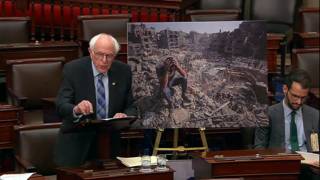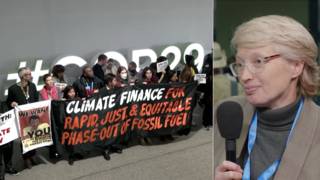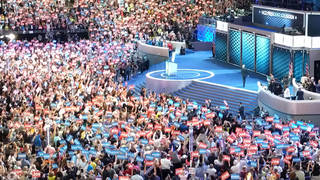
Related
Guests
- Lee Fanginvestigative journalist at The Intercept covering the intersection of money and politics.
As the Democratic National Convention approaches, some Democrats are considering pressuring DNC Chairwoman Debbie Wasserman Schultz to step down. Democratic presidential candidate Bernie Sanders has long accused Wasserman Schultz of being biased toward Hillary Clinton. Wasserman Schultz has also quietly repealed ethics rules implemented in 2008 by President Obama preventing federal lobbyists from donating to the DNC. The opposition from Capitol Hill Democrats comes as Wasserman Schultz is also in a tight race against progressive challenger Tim Canova for her own congressional seat in Florida. In an unusual move, Sanders has backed Canova. For more, we’re joined by Lee Fang, investigative reporter for The Intercept.
Transcript
AMY GOODMAN: Lee Fang, you’re also looking at this whole controversy around Deborah Wasserman Schultz. There’s been, in the last week, calls, especially Bernie Sanders, calling for her to be removed as head of the DNC, because he feels she favors Hillary Clinton. He—Sanders then supported her opponent in the congressional race—in her own congressional race. But talk about Debbie Wasserman Schultz and her influence.
LEE FANG: Right. There’s been a lot of controversy about the leadership of Debbie Wasserman Schultz over the Democratic National Committee. One kind of contrast here is that as—just as Obama pushed to reform the DNC and, when he became the nominee in 2008, he implemented ethics rules that prevented federal lobbyists from donating to the DNC or to the party convention, Debbie Wasserman Schultz has quietly repealed those ethics rules. Now lobbyists can again donate to the party. And last fall, Debbie Wasserman Schultz actually convened a meeting with a number of lobbyists and reportedly handed out a menu of options saying that, you know, if you give varying amounts of money, lobbyists can win certain types of influence at the convention. So, the role of money in politics, which has been a big campaign theme in the presidential primaries, we’re seeing that now come into focus with this tension between Debbie Wasserman Schultz and the Bernie Sanders campaign.
AMY GOODMAN: And then you have Bernie Sanders choosing five people for the platform committee, among them Cornel West; Jim Zogby, as well; Bill McKibben, of course, well known for his stands on the environment and climate change; and Keith Ellison, the congressman from Minneapolis, head of the Congressional Progressive Caucus.
LEE FANG: Yeah, that’s right. And the way that this fight is now manifesting is over this platform committee that you’re referencing. This is the committee that writes the official positions of the Democratic Party, symbolic in nature, but it’s now shaping up to be kind of a big fight because each—both the Bernie Sanders campaign and the Hillary Clinton campaign selected representatives for this committee, also DNC Chair Debbie Wasserman Schultz picked some of the representatives. And again, we’re seeing this coming down to kind of the role of activists. Bernie Sanders picked representatives largely from the activist community, while the DNC and the Clinton campaign selected several individuals from the lobbying community to serve on this official platform committee creating the official positions of the Democratic Party. And Bernie Sanders’ campaign has said that they want to push the Bernie message into the policy platform, including reducing the role of money in politics. So, at least a very kind of symbolic gesture there.
AMY GOODMAN: Lee, very quickly, you also recently co-wrote a piece about Hillary Clinton and fracking, based on State Department emails obtained by The Intercept, the emails showing how the State Department worked closely with oil and gas companies and worked with other nations to secure investments for fracking projects. Was this while Hillary Clinton was secretary of state?
LEE FANG: Yeah, we conducted a FOIA. I worked with another reporter named Steve Horn, and we received dozens of new emails showing a new layer of how aggressive this initiative was, that Hillary Clinton not just traveled the world to promote fracking, she—according to these emails, her aides discussed using Poland as a laboratory to show that fracking could be successful in Europe and then to take that model and spread fracking all across both Eastern and Western Europe, where we’ve seen a lot of opposition to fracking. The emails also show a very close bond with industry, that Hillary Clinton’s aides worked closely with large fossil fuel companies to pressure foreign governments around the world to adopt American-style fracking.
AMY GOODMAN: I want to thank you, Lee Fang. We’ll link your pieces at The Intercept, as you cover the intersection of money and politics.
LEE FANG: Thank you, Amy.












Media Options